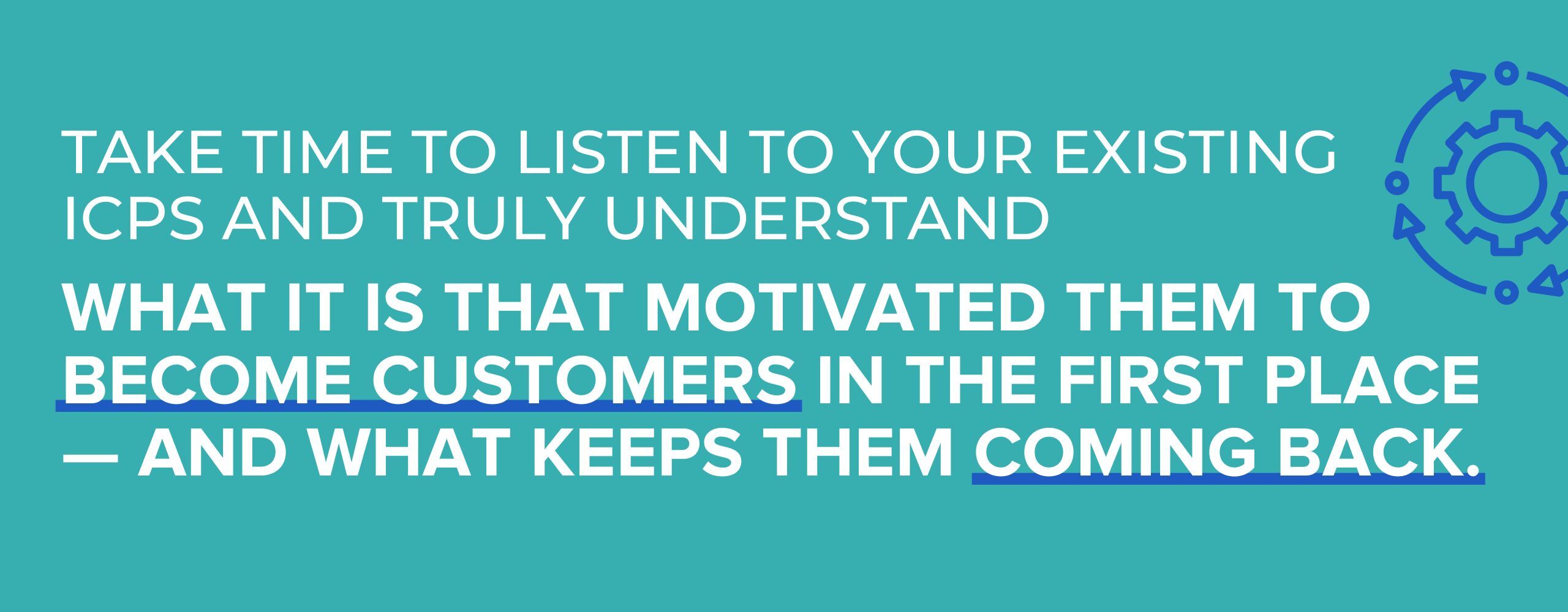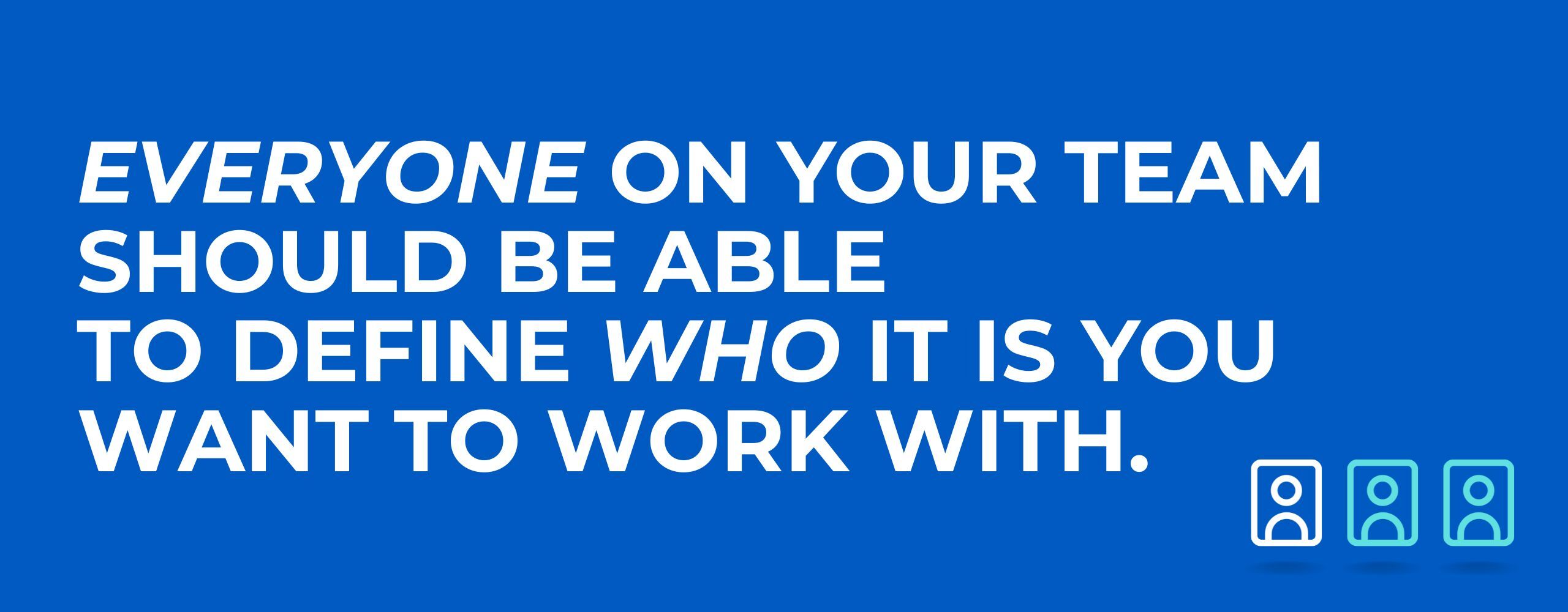Subscribe now and get the latest podcast releases delivered straight to your inbox.
24 Essential Questions for Understanding Your Ideal Customer (+ Infographic)

By Dia Vavruska
Dec 1, 2022

If you don't understand your customers, you're going to struggle to sell to them.
Your website messaging will sound off. Your email marketing won't resonate. Your sales presentations will fall flat.
In the marketing world, we talk often about the Ideal Customer Profile, or ICP.
In layman’s terms — it’s the perfect person or company you want to sell to, over and over again. It's those customers who are the most profitable, replicable, or efficient in terms of delivery.
Understanding your ICP is the first step connecting with more.
Why you need to identify your ideal customer
Your ICP is who your inbound marketing efforts should strive to attract. They are also the customers you want to delight and retain within your current book of business.
Knowing who your ICP is can help you set direction as a sales or marketing team — and as an entire company.
If sales isn’t sure whether or not a prospect is the right fit, if you’re considering reworking your website content to attract the right buyer, or you’re looking to improve your customer experience, you can refer back to your ICP to help guide those decisions.
How is an ICP different from a buyer persona?
It's easy to confuse an ICP with a buyer persona, and there is some overlap, so let's clear it up.
While both try to generalize about your customer base, an ICP tends to focus more on hard data, while a buyer persona is a semi-fictionalized character that buys from you that includes qualitative information and even personality traits to bring that person to life.
But the topic today is ICP, so let's dive in.
So how do you define your organization’s ICP? You can start by asking questions that will help you paint the picture of who this is and how you can best serve them in your customer journey.
Questions to help you define your ICP
The questions below are a mixture of research prompts and questions you'll ask your team members.
You may decide to tackle these in a different order, depending on the needs of your organization, but this is the order we recommend.
Questions to ask your service delivery team
Talking to people on the frontline of your services is critical.
They work with your customers or clients first-hand on a daily basis and can help you better understand your best customers after the point of sale.
This information is invaluable to the organization as you consider the full scope of the customer journey. You may even be able to identify certain behaviors or patterns to help you identify future good-fit prospects.
To understand exactly what makes your ICP an ideal fit, ask your service delivery team members:
1. What do our best/most successful customers look like? (This could include: business size, annual revenue, industry, etc. for B2B, or demographic or location data for B2C)
2. How long does it take the average customer to reach a milestone of success?
3. How long do they typically work with us (or how many repeat purchases do they typically make)?
4. What products or services do they purchase throughout their lifecycle with us?
5. Who do we typically work with on the day-to-day? Is that the core decision maker?
Questions to ask your sales team
Once you have information about successful customers from your services team, go talk to sales. The right questions will help you identify ideal customers early in the sales process.
The right information can help you identify good-fit customers earlier in the sales process. In doing so, you can refine your sales process to better serve them.
Ask questions like:
6. How did these ideal customers initially come to us? Were they organic leads through the site or did we prospect them through our own efforts?
7. What are the key goals or objectives they’re looking to fulfill through working with our company?
8. What were the common concerns, questions, and objections these buyers expressed during the sales process?
9. What was the first purchase they made (or initial investment)?
10. What is the average lifetime value of an ICP?
11. How long does it take to close the sale?
12. How many repeat purchases do they make?
13. Who (on the customer side) is involved in the sales process? Who makes the final decision?
Questions to ask your (best) existing customers
Who better to ask about your ideal prospects than the people themselves?
If you already identified a group of customers from your book of business that you’d peg as the “ideal customer,” sit down and ask them about their experience. If you don't, ask your frontline workers.

Sit down with them, either 1-1 or in small groups and ask them:
14. Why did you initially choose to do business with our company?
15. What keeps you a customer or a repeat buyer?
16. What did you like and dislike about the sales process?
17. What would you change about doing business with us?
18. Would you be willing to give referrals to other buyers like you?
Take time to listen to your existing ICPs and truly understand what it is that motivated them to become customers in the first place — and what keeps them coming back.
Painting this picture will help you replicate that experience time and time again.
Assess the profitability of working with different types of customers
Determining your ICP must also make good business sense.
While you or your employees may enjoy working with a particular type of customer, if they cost you more to service than you’re netting in profits, they aren’t good for the health of the organization.
Your ICP should be a good mix of cultural fit and high profitability.
You can identify them by researching questions like:
19. Which customers are the most profitable for our business and why?
20. Are there ways to increase efficiencies and profitability on other accounts?
21. What is the current makeup of our client or customer base? How many true ICPs are we already working with?
If you look at this analysis in black and white, you may be surprised at what you’ll find.
This kind of data could lead your organization to pivot away from certain types of customers that cost too much to service. Or, you may find that your team already works with a high concentration of ICPs and is on the right track to maintaining profitability.
Either way, assessing your current book of business will enable you to put together a realistic view of where you are and where you want to go as an organization.
Determine how you want to grow as a business to support your ICPs
Anyone in product, service delivery, or sales may tell you who they think the ICP is, but it needs to align with where you're growing as a business.
This understanding from the top down will ensure you bring on the right customers and keep the right customers.
In other words, it’ll help your organization achieve what it wants to.
Without this alignment, your internal teams may run into constant tensions questioning
- Who it is they should be working with
- What work they should be prioritizing
- How to set accurate goals or metrics of success
Ultimately, this will affect the profitability of your business and the happiness of your customers and team.
To avoid this, ask yourself:
22. Which of your products or services do your ideal customers purchase most frequently?
23. Which of your products or services are they not utilizing? Does it make sense to sunset those products — or is there an opportunity to better position those products to these customers?
24. Are there gaps in your current solutions that need to be addressed to support your ICPs?
Everyone in your organization should be able to describe your ICP
Once you have a solid idea of what your ICP looks like and how you define them, it’s imperative you share this information with your entire company. 
This could be accomplished through an all-hands style meeting, delivered individually from department/management leads, or posted to an internal network. No matter how you decide to inform the team, it needs to be clear and documented.
Your findings should be easily accessible for the team to refer back to whenever needed to make decisions and set direction as an organization.
And you should revisit them regularly (say, once per year) to update.
Everyone on your team should be able to define who it is you want to work with (that is, your ICP), and more importantly, identify when someone isn’t a fit.
This will:
- Make it easier to be selective in the sales process
- Make for better relationships with your existing customers
- Inspire your team from top to bottom to make better decisions for the business
These 24 questions could lead to more innovative products or services to meet the needs of your ICPs, better investments in staffing or technology, evolving processes to support an exceptional customer experience, and so much more.
Scroll down to see a full infographic summarizing these core questions.
-jpg.jpeg)


Order Your Copy of Marcus Sheridan's New Book — Endless Customers!